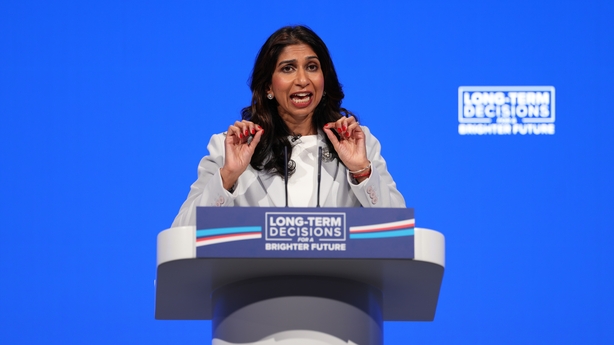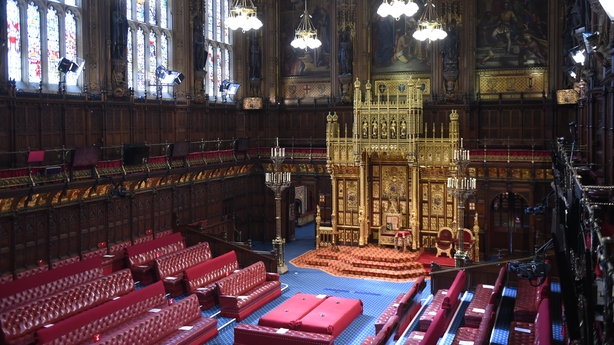The hardcore Brexiteers were once known as 'The Spartans'. They seemed to revel in the image of steely-eyed warriors armed with purity of purpose.
However, after last week's failure to disrupt the Rwanda vote, they were more reminiscent of the nursery rhyme character the "Grand Old Duke of York".
He famously marched his men to the top of the hill only to march them down again.
The rebels' threat to vote down the bill if their demands were not met had been taken seriously.
The first part of the drama came last month when the bill was introduced to the House of Commons.
A rebellion was threatened and speeches were made but in the end not one single Tory MP voted against it.
Although it is believed that 25 abstained over their opposition to it.
This was explained at the time as tactical, they were giving Prime Minister Rishi Sunak more time to fix the new law.
They wanted tougher restrictions to stop legal challenges against deportations either from individual asylum seekers or the European Court of Human Rights.
The so-called "Five Families" of hard-right Tory MPs who represent five groupings and 100 backbenchers threatened to vote against the bill when it came back to the Commons unless those amendments were made.
Journalists were being briefed that without the amendments "it will be killed".

That result would have convulsed the Conservative Party, and almost certainly led to a leadership contest and possibly a general election.
When the bill came up for debate in its third and final reading last week the rebels' language was emphatic and the warnings were dire.
They said without amendments the plan to send asylum seekers to Rwanda would be bogged down and ultimately thwarted by multiple legal challenges.
MPs like former home secretary Suella Braverman said it would be a betrayal of the government's promise, while others like Robert Jenrick talked of the government being willing to allow interference by a foreign court.
Two vice chairs of the party resigned so they could vote for the amendments.
Former prime minister Boris Johnson tweeted his encouragement.
As the pressure ramped up on Mr Sunak, a total of 61 Tory backbenchers voted for amendments, the biggest rebellion of Mr Sunak's premiership.
Journalists were being told that the momentum was with the rebels.
Only 30 Tories were needed to vote against the bill for it to be defeated as Labour and other parties were opposed to the plan.
However, despite all the bluster, the rebellion petered out all of a sudden.
A meeting of 45 hard-right MPs was held in a Westminster backroom shortly before the final vote was held.
It was clear there was no stomach for the fight.
It was one thing voting for amendments as Labour's opposition meant they were not going to succeed anyway. But to vote down the bill was another matter.
Tory MPs were telling journalists that the bill as it stood was better than none at all and they did not want yet another leadership election.
The point was that all of this would have been obvious beforehand.
The fact was that the government held its nerve. The rebels lost theirs.
Not even the two vice chairs of the party who resigned voted against the bill.

One of them, Nottingham MP Lee Anderson, has come to embody the so-called "Red Wall" where former Labour strongholds turned Conservative in 2019.
Mr Anderson is an ex-miner and caused controversy when he said that if asylum seekers did not like their accommodation in Britain they could "F*** off back to France".
But even he decided not to rock the boat in the end.
As he explained to GB News, where he works as a presenter, he changed his mind when he walked into the "no lobby".
"The Labour lot were all giggling and laughing and taking the mick," he said.
He said he could not go through with it and walked out. He added that the whole affair had upset him.
Times have changed for the Tory right. At one time the European Research Group (ERG) had a hard core of 28 "spartans" but could call on up to 90 supporters.
They were instrumental in voting down Theresa May's Withdrawal Agreement and ending her premiership in 2019.
At the time, they were described in the Financial Times as the most influential party grouping in recent political history.
However, last week only 11 MPs actually voted against the Rwanda Bill in the end.
It was reported that champagne corks were literally being popped in government offices.
This is not the first defeat for the Tory hard right, a similar rebellion was promised over the Windsor Agreement on the Northern Ireland Protocol on the basis that it left EU law in place in part of the United Kingdom.
Senior Tories like Boris Johnson, Liz Truss and Priti Patel joined the rebel ranks in the run-up to the vote last March.
But the final tally of rebels was only 22. Now that amount has been exactly halved.
Mr Johnson is gone from Westminster while neither Ms Truss nor Ms Patel were anywhere to be seen in terms of contributions to the Rwanda debate.
Another defeat for the hard Brexiteers came last May when the government decided to leave 2,500 pieces of EU legislation on the statute books contrary to previous promises.
The ERG MPs were furious but there was nothing they could do when the government announced it was withdrawing legislation that would ditch the EU rules.
Meanwhile, the Rwanda legislation is now expected to be passed by the House of Lords.
There are almost certainly going to be legal actions when the new law comes into force.
However, according to legal opinion, this would have happened even with the amendments demanded by the hard right.
Britain remains part of the European Convention on Human Rights (ECHR) and even as it stands the Rwanda bill is thought to be in breach of its provisions.
In particular, because it allows a minister to ignore its injunctions.
It opens up issues of constitutional law and possible challenges.
Possible future leadership contenders like the veteran spartan Suella Braverman may campaign for the UK to leave the ECHR.
For the moment though, the Tory hard right is being regarded as a spent force and following the latest drama in Westminster it is thought unlikely that there will be a leadership contest ahead of the next general election.







